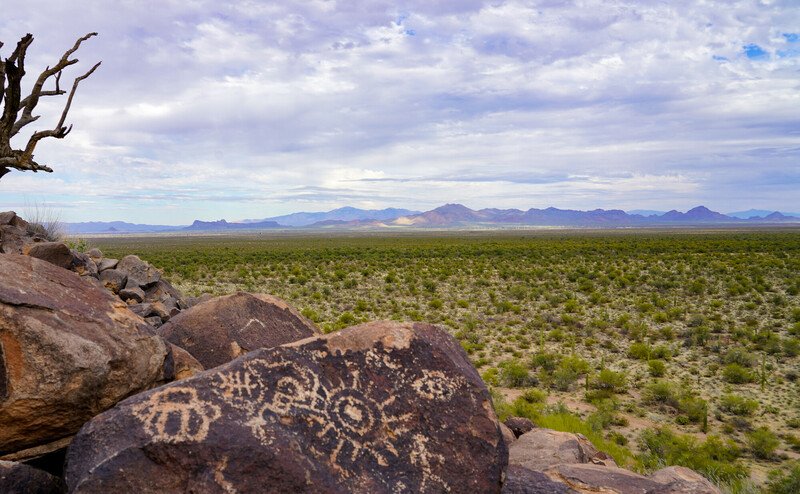For Immediate Release, January 22, 2025
|
Contact: |
Russ McSpadden, Center for Biological Diversity, (928) 310-6713, [email protected] |
Lawsuit Forces Agencies to Halt Arizona Highway Plan Threatening Monuments, Endangered Species
TUCSON, Ariz.— In response to a lawsuit from conservation groups, the Federal Highway Administration and Arizona Department of Transportation have agreed to halt planning activities and reevaluate their approval of Interstate 11. As a result, a court stayed the case today until the reevaluation is completed. The proposed 280-mile highway between Nogales and Wickenburg, Arizona, would pose significant threats to endangered species, public lands, water and the climate.
Under the agreement, the Federal Highway Administration will review the interstate’s compliance with environmental laws and hold a 60-day public comment period.
“The interstate’s approval was based on a deeply flawed environmental analysis that the Federal Highway Administration now has a chance to fix,” said Russ McSpadden, Southwest conservation advocate at the Center for Biological Diversity. “Interstate 11 would devastate treasured places like the Sonoran Desert National Monument. It also poses grave threats to endangered wildlife like cactus ferruginous pygmy owls. I hope this agreement will make sure the agencies stop ignoring community concerns about the highway’s threats to plants, wildlife, people and the climate.”
In addition to pygmy owl habitat, the highway would destroy habitat for other protected wildlife, including western yellow-billed cuckoos, Yuma Ridgway’s rails and southwestern willow flycatchers.
State and federal transportation agencies are considering two possible routes for the Pima County stretch of the highway. The east option would locate Interstate 11 along existing Interstate 10. The west option would route Interstate 11 west of Tucson, through desert wildlands in rural Avra Valley and between Saguaro National Park and Ironwood Forest National Monument. It would impact traditional lands of the Tohono O’odham Nation, disturb hundreds of archaeological and cultural sites and spread invasive buffelgrass that would fuel more wildfires.
“The Federal Highway Administration’s review must be a genuine effort to address the significant environmental harms this freeway would cause,” said Kate Hotten, co-executive director at the Coalition for Sonoran Desert Protection. “The west option must be permanently abandoned to uphold the integrity of Pima County’s Sonoran Desert Conservation Plan, protect fragile ecosystems like Saguaro National Park, and Pima pineapple cactus.”
Conservation groups sued the highway administration in April 2022 for conducting an inadequate environmental review before approving possible routes for the proposed highway. In May 2023 U.S. District Judge John Hinderaker denied a government motion to partially dismiss the lawsuit. The groups then submitted an amended complaint saying the agency also failed to analyze the highway’s threats to endangered species, as required under the Endangered Species Act.
“This is an important step toward holding the Federal Highway Administration accountable for the environmental and legal violations tied to Interstate 11,” said Tom Hannagan of Friends of Ironwood Forest. “The agencies involved have failed to address the devastating harm this project would cause, including threats to Ironwood Forest National Monument. They’ve also ignored the concerns of local communities, Tribal nations and conservationists who know this highway is unnecessary and destructive. We won’t stand by and watch our beloved Sonoran Desert be destroyed.”
A revised environmental review could lead to a supplemental environmental impact statement, consultation with the U.S. Fish and Wildlife Service, and potentially a new decision about the project.
“Interstate 11 threatens to divide and degrade irreplaceable and increasingly rare habitats along its entire proposed route, impacting not only endangered species like the western yellow-billed cuckoo and southwestern willow flycatcher, but also the biodiversity that defines Arizona’s natural heritage,” said Melissa Fratello, executive director at Tucson Audubon Society. “This project risks undermining decades of conservation work, including significant federal investment, to protect ecosystems that sustain wildlife, support local communities, and contribute to Arizona’s unique identity and economy. We’re glad that legal action has pushed agencies to take responsibility, and we hope this review leads to a commitment to preserving these critical lands for future generations.”
Background
In November 2021 the Federal Highway Administration approved the 280‐mile‐long corridor for Interstate 11. Proponents envision it as part of an interstate route to Las Vegas that could eventually be expanded to cut across the entire western United States between Mexico and Canada. The Arizona Department of Transportation will decide the route through Pima County.
Objections to the proposed west option have come from elected officials of the city of Tucson, town of Sahuarita, and Pima County, as well as U.S. Rep. Raul Grijalva (D-Ariz.), the U.S. Bureau of Reclamation and the National Park Service. Their concerns include increased suburban sprawl, groundwater contamination, and degrading the wilderness, wildlife habitat and recreational values of Saguaro National Park West, Tucson Mountain Park, and Ironwood Forest and Sonoran Desert National Monuments.
They’re also concerned the interstate would lead to development of conservation lands that have been set aside to mitigate harm from other projects, including the Bureau of Reclamation's Tucson Mitigation Corridor and lands protected under Pima County’s Sonoran Desert Conservation Plan.

The Center for Biological Diversity is a national, nonprofit conservation organization with more than 1.7 million members and online activists dedicated to the protection of endangered species and wild places.

